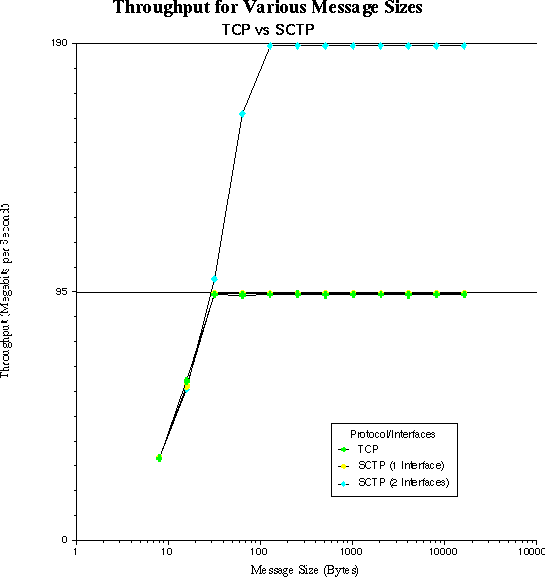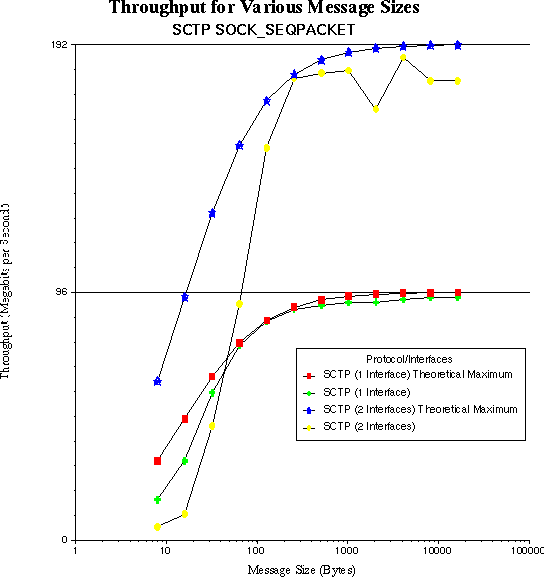SS7 for the
Common Man
© Copyright 1997-2004,OpenSS7 Corporation, All Rights Reserved.
Last modified: Thursday, 12-Aug-2004 05:39:30 MDT
| |
|
Home
|
SCTP Performance
Test Configuration
The test configuration consists of two (2) 2.57 MHz UP Pentium IV machines, each equiped with 2 100BaseT interface cards (one cheap WalMart PCI card and one on the Motherboard), connected via a D-Link autosensing 10/100 Mbps Layer 2 switch. One Pentium IV machine runs RedHat 9 (with updates) and the kernel-2.4.20-28.9.sctp.0.2.19.1.i686.rpm binary RPM, the other, RedHat 7.2 (with updates) and the kernel-2.4.20-28.7.sctp.0.2.19.1.i686.rpm binary RPM. Default settings were used for all SCTP protocol parameters.
A modified version of Iperf Version 1.6.5 is used to perform tests. The modified version of Iperf can be downloaded in the iperf-1.6.5-openss7-sctp.tar.gz tarball.
The diagram, below, shows the test configuration.

Results
SCTP vs TCP
Testing was performed separately with iperf for TCP, SCTP with 1 interface, and SCTP with 2 interfaces, using host pumbah (192.168.0.4, 192.168.2.4) as the server and host porky (192.168.0.5, 192.168.2.5) as the client. (iperf by default opens a IPPROTO_SCTP, SOCK_STREAM socket for SCTP.)
Iperf invocation commands, where, $n is 8, 16, 32, 64, 128, 256,
512, 1024, 2048, 4096, 8192, 16384, are as follows:
TCP
pumbah #> iperf -s
porky #> iperf -c pumbah -l $n
SCTP (1 Interface)
pumbah #> iperf -s -B 192.168.2.4 -z
porky #> iperf -c 192.168.2.4 -B 192.168.2.5-l $n -z
SCTP (2 Interfaces)
pumbah #> iperf -s -z
porky #> iperf -c pumbah -l $n -z
The tabulated results are as follows:
| Message | TCP | SCTP | SCTP |
|---|---|---|---|
| Length | (1 Interface) | (1 Interface) | (2 Interfaces) |
| (Bytes) | (Mbps) | (Mbps) | (Mbps) |
| 8 | 31.4 | 31.7 | 31.6 |
| 16 | 61.0 | 59.0 | 57.9 |
| 32 | 94.0 | 94.4 | 99.9 |
| 64 | 93.8 | 94.4 | 163 |
| 128 | 94.0 | 94.4 | 189 |
| 256 | 94.1 | 94.4 | 189 |
| 512 | 93.9 | 94.4 | 189 |
| 1024 | 94.0 | 94.4 | 189 |
| 2048 | 94.0 | 94.4 | 189 |
| 4096 | 93.9 | 94.4 | 189 |
| 8192 | 94.0 | 94.4 | 189 |
| 16384 | 94.0 | 94.4 | 189 |
A graph of the results is shown below.

The following conclusions can be drawn from the results:
At small (less that 64-byte) write message sizes, the machines are compute bound.
At large (greater thatn 64-byte) write message sizes, the machines are network bound.
Performance of OpenSS7 SCTP is equivalent to TCP when an association is formed with a signle interface on each host. (In fact, SCTP outperformed TCP slightly on throughput, yeilding 94.4 Mbps throughput vs. TCP 94.1 Mbps at larget message sizes.)
When multiple interfaces are used for SCTP, OpenSS7 SCTP significantly outperformed TCP by virtue of the fact that both interfaces could be utilized and the hosts were connected with a Layer 2 Ethernet switch.
OpenSS7 SCTP provides a superior alternative to TCP.
In similar tests, other SCTP implementations performed dismally (around 40 Mbps). See, for example, the DataTAG tests.
SCTP SOCK_SEQPACKET
Testing was performed separately with iperf for SCTP with 1 interface and SCTP with 2 interfaces, using host pumbah (192.168.0.4, 192.168.2.4) as the server and host porky (192.168.0.5, 192.168.2.5) as the client. (iperf was modified by hand to open an IPPROTO_SCTP, SOCK_SEQPACKET socket instead of a SOCK_STREAM socket.)
Iperf invocation commands, where, $n is 8, 16, 32, 64, 128, 256,
512, 1024, 2048, 4096, 8192, 16384, are as follows:
SCTP (1 Interface)
pumbah #> iperf -s -B 192.168.2.4 -z
porky #> iperf -c 192.168.2.4 -B 192.168.2.5-l $n -z
SCTP (2 Interfaces)
pumbah #> iperf -s -z
porky #> iperf -c pumbah -l $n -z
The tabulated results are as follows:
| Message | SCTP | SCTP | SCTP | SCTP |
|---|---|---|---|---|
| Length | (1 Interface) | (1 Interface) | (2 Interfaces) | (2 Interfaces) |
| Theoretical | Theoretical | |||
| (Bytes) | (Mbps) | (Mbps) | (Mbps) | (Mbps) |
| 8 | 30.8 | 15.7 | 61.6 | 5.17 |
| 16 | 47.1 | 30.7 | 94.2 | 10.1 |
| 32 | 63.4 | 57.1 | 127 | 44.3 |
| 64 | 76.5 | 75.6 | 153 | 91.6 |
| 128 | 85.2 | 84.8 | 170 | 152 |
| 256 | 90.3 | 89.5 | 181 | 179 |
| 512 | 93.1 | 90.9 | 186 | 181 |
| 1024 | 94.5 | 92.2 | 189 | 182 |
| 2048 | 95.3 | 92.2 | 191 | 167 |
| 4096 | 95.7 | 93.3 | 191 | 187 |
| 8192 | 95.9 | 94.1 | 192 | 178 |
| 16384 | 95.9 | 94.1 | 192 | 178 |
A graph of the results is shown below.

The following conclusions can be drawn from the results:
For a single interface, OpenSS7 SCTP approaches the theoretical maximum for the link.
For double interfaces, with message sizes less than 64 bytes, SOCK_SEQPACKET performs poorly. For message sizes greater than 64 bytes, SOCK_SEQPACKET performance is comparable to SOCK_STREAM performance.
Gains could be acheived by altering the fragmentation logic in OpenSS7 SCTP for SOCK_SEQPACKET only to fragment Association Maximum Payload Size DATA chunks down to a fraction of the maximum payload size. This would permit better overall bundling of DATA chunks into SCTP packets.
| |
|
Home
|
SS7 for the
Common Man
© Copyright 1997-2004,OpenSS7 Corporation, All Rights Reserved.
Last modified: Thursday, 12-Aug-2004 05:39:30 MDT